Montessori Toys
Top Materials for Crafting DIY Educational Toys

Welcome to our guide on the best materials for creating DIY educational toys! Our aim is to ignite your imagination and foster a passion for discovery.
With wood, fabric, cardboard, recycled materials, and natural materials, the possibilities are endless. Whether you’re a parent, teacher, or caregiver, these materials will empower you to create engaging and enriching toys that foster curiosity and knowledge.
Let’s dive in and discover the joy of crafting educational toys that serve the little ones in our lives!
Key Takeaways
- Wood is a durable and versatile material that promotes sensory exploration and fine motor skills, while also encouraging imaginative play and problem-solving abilities.
- Fabric allows for various sewing techniques, enhances aesthetic appeal, and promotes fine motor skills development, while also stimulating tactile and visual senses for cognitive development.
- Cardboard is a versatile and accessible material that encourages creativity and problem-solving skills, while also teaching children about recycling and environmental consciousness.
- Recycled materials, such as plastic bottles, tin cans, and cardboard tubes, promote creativity, problem-solving, and sustainability, while also teaching principles of physics and reducing waste.
Wood
When crafting DIY educational toys, we prefer using wood for its durability and versatility. Wooden blocks and puzzles are excellent choices for children’s learning and development.
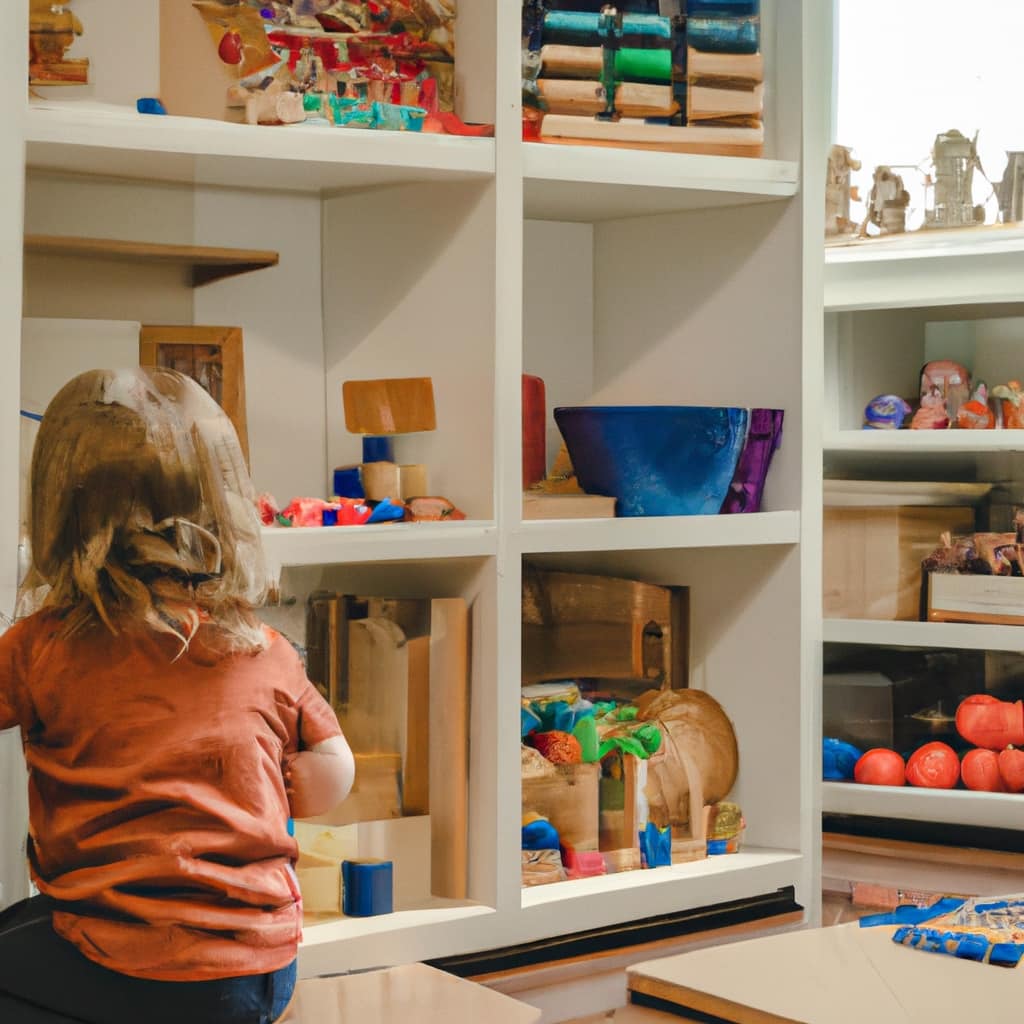
Wood is a natural material that can withstand rough play and last for generations. Its sturdiness ensures that the toys can endure the wear and tear of enthusiastic little hands.
Additionally, wood can be easily shaped and carved into various sizes and shapes, making it ideal for creating puzzles and blocks in different designs. The tactile experience of playing with wooden toys promotes sensory exploration and fine motor skills.
Furthermore, wooden toys encourage imaginative play and problem-solving abilities, as children can build, stack, and create endless structures with the blocks.
Fabric
Next, let’s explore the benefits of using fabric as a material for crafting DIY educational toys. Fabric offers a wide range of possibilities when it comes to creating engaging and interactive toys for children. Here are three reasons why fabric is an excellent choice for crafting educational toys:
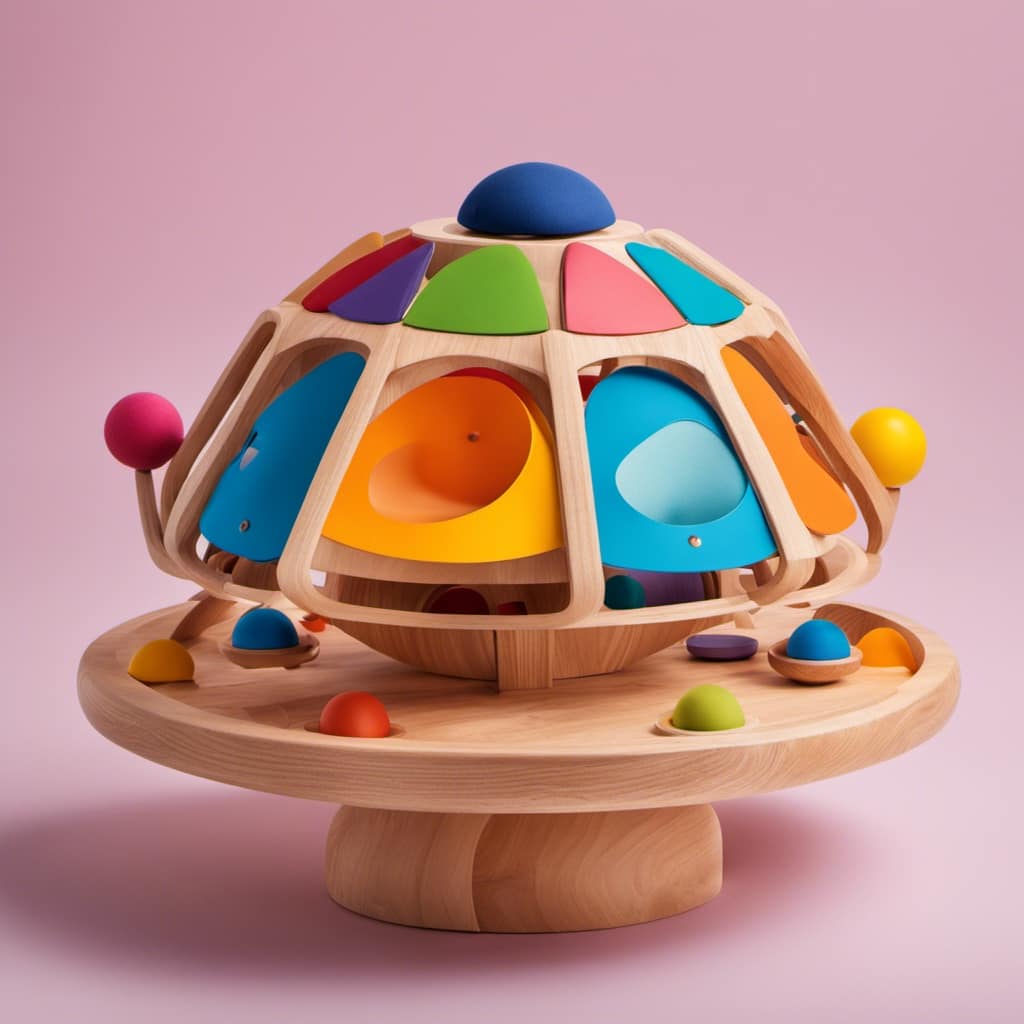
-
Sewing techniques for fabric toys: Fabric allows for the use of various sewing techniques, such as appliqué, embroidery, and quilting. These techniques not only enhance the aesthetic appeal of the toys but also promote fine motor skills development in children.
-
Creative fabric manipulation techniques for educational toys: Fabric can be easily manipulated and transformed into different shapes and textures. This opens up opportunities for creating sensory toys that stimulate a child’s tactile and visual senses, fostering their cognitive development.
-
Versatility and durability: Fabric is a durable material that can withstand the wear and tear of playtime. It’s also versatile, allowing for the creation of toys with different textures, colors, and patterns, which can aid in sensory exploration and learning.
Cardboard
Now, let’s delve into the benefits of using cardboard as a material for crafting DIY educational toys.

Cardboard is an incredibly versatile and accessible material that can be easily found in most households. Its affordability and availability make it an ideal choice for creating educational toys on a budget.
Cardboard can be used to make a variety of toys, such as puzzles, building blocks, and even interactive games. It can be easily cut, folded, and shaped into different forms, allowing children to explore their creativity and problem-solving skills.
Additionally, cardboard is a sustainable material, making it environmentally friendly. By repurposing cardboard, we can teach children about the importance of recycling and being conscious of our impact on the planet.
Recycled Materials
Moving on to another excellent choice for crafting DIY educational toys, let’s explore the use of recycled materials. Not only does repurposing items help to reduce waste and protect the environment, but it also provides an opportunity to teach children about sustainability and creativity.
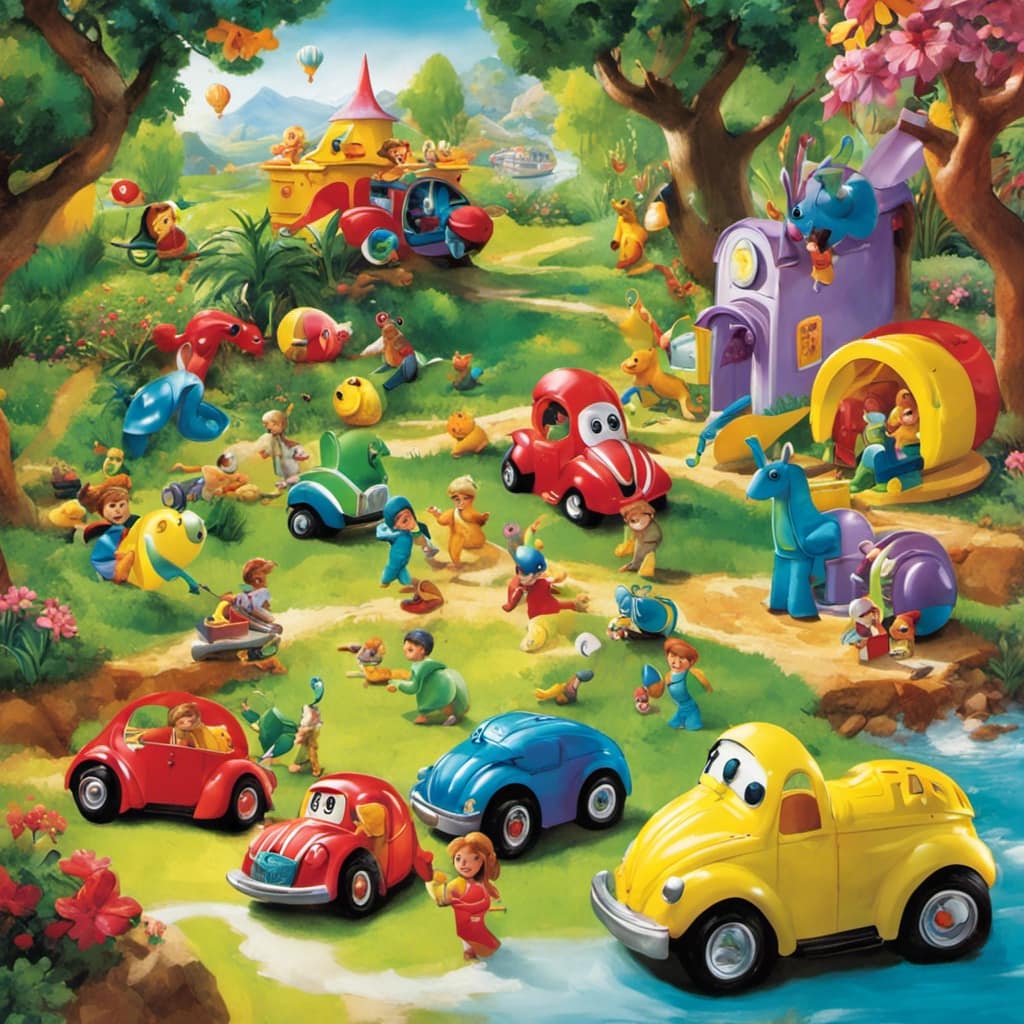
Here are three commonly found recycled materials that can be used to create engaging educational toys:
-
Plastic bottles: These versatile containers can be transformed into sensory bottles, where children can explore different textures, colors, and sounds. They can also be used to make water rockets, allowing kids to learn about the principles of physics and pressure.
-
Tin cans: Empty tin cans can be transformed into simple musical instruments, such as drums or shakers. This allows children to explore rhythm, coordination, and creativity while making joyful music.
-
Cardboard tubes: From paper towel rolls to toilet paper tubes, these can be transformed into building blocks, marble runs, or even binoculars. This encourages problem-solving skills, spatial awareness, and imaginative play.
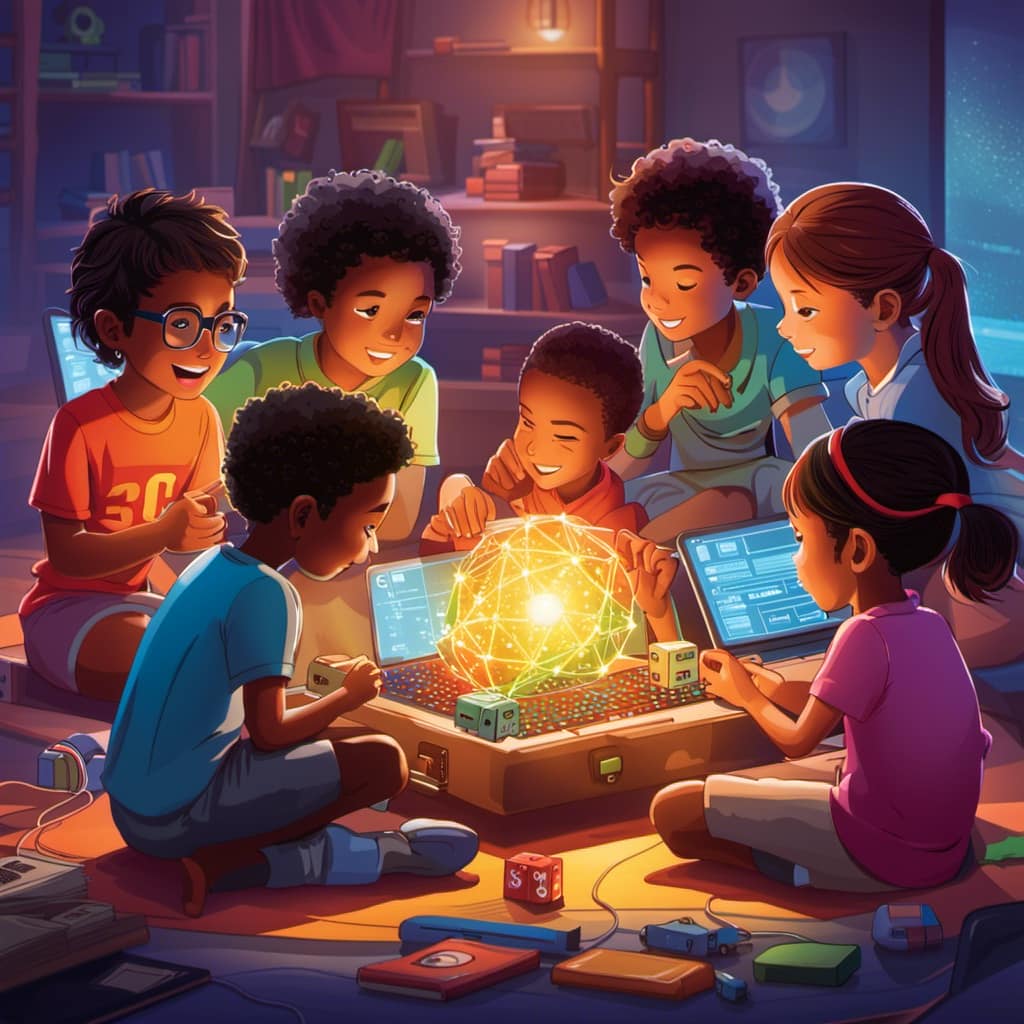
Natural Materials
After exploring the use of recycled materials, let’s now delve into the possibilities offered by natural materials for crafting DIY educational toys.
Natural materials provide a unique opportunity for outdoor learning and incorporating nature into playtime. They offer a sensory experience that engages children’s senses and promotes sensory play. By using materials such as sticks, stones, leaves, and pinecones, children can explore different textures and develop their tactile awareness.
They can also learn about the natural world and develop a deeper appreciation for the environment. Incorporating natural materials in DIY toys allows children to connect with nature while enhancing their creativity and problem-solving skills.
Frequently Asked Questions
How Can I Safely Sanitize Wooden Educational Toys for My Child?
To safely sanitize wooden educational toys for our child, we can make homemade disinfectant using child safe cleaning products. Here are some tips on choosing the right cleaning products to keep our child’s toys clean and germ-free.
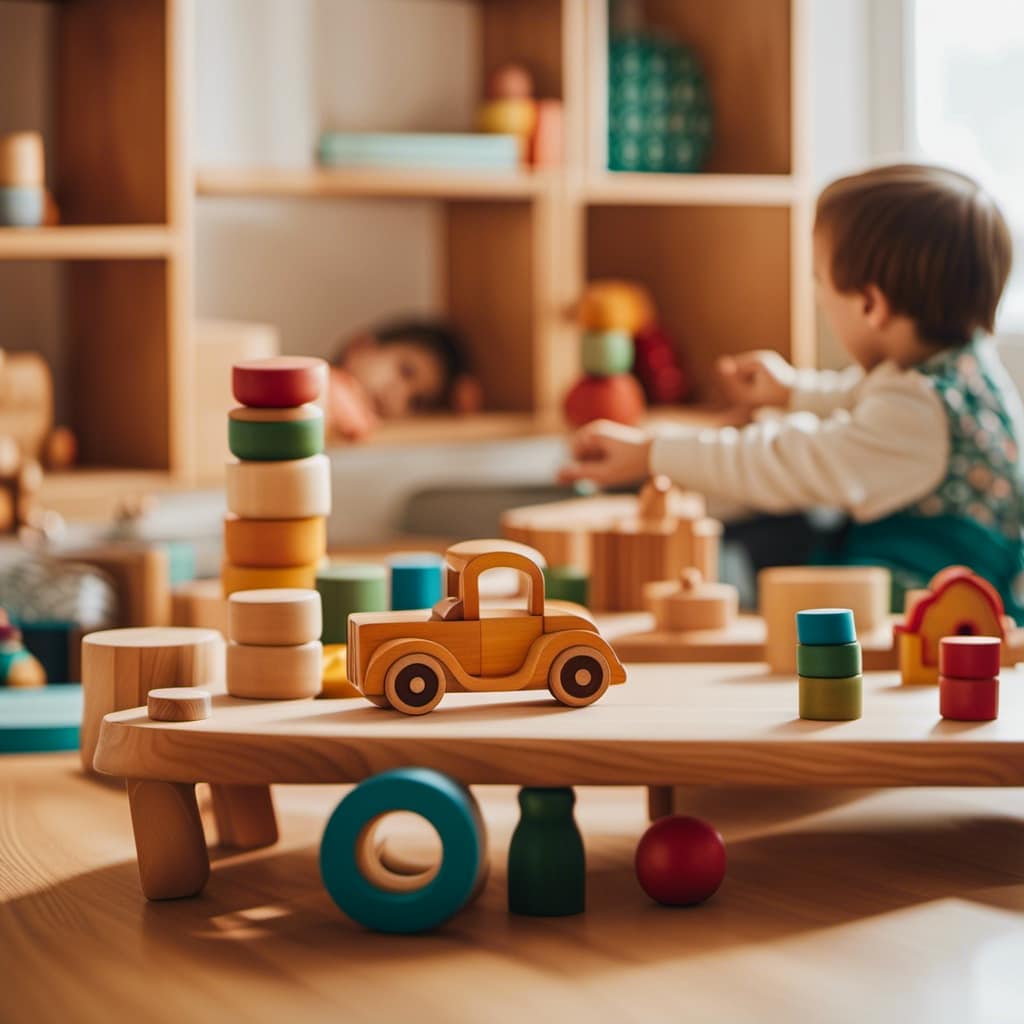
Are There Any Specific Types of Fabric That Are More Suitable for Crafting Educational Toys?
When it comes to crafting educational toys, we’ve found that certain types of fabric are more suitable. Not only does using eco-friendly materials benefit the environment, but it also enhances the learning experience for children.
What Are Some Creative Ways to Upcycle Cardboard Into Educational Toys?
Creative cardboard crafts are a great way to make DIY educational toys. We can create puzzles, building blocks, and even pretend play sets using cardboard. It’s a fun and budget-friendly way to encourage learning and creativity in children.
Can You Provide Some Examples of Common Household Items That Can Be Repurposed as Educational Toys?
We love finding creative ways to repurpose common household items into educational toys. By using recyclable materials, we can create fun DIY projects that incorporate STEM learning and inspire young minds.
How Can I Ensure That the Natural Materials Used in Crafting Educational Toys Are Non-Toxic and Safe for Children?
To ensure the safety of children, we prioritize using eco-friendly alternatives to plastic in crafting educational toys. We also carefully select non-toxic paints, so kids can have fun while learning in a healthy environment.

Conclusion
In conclusion, when it comes to crafting DIY educational toys, the possibilities are endless. Whether you choose to work with wood, fabric, cardboard, recycled materials, or natural materials, each option offers unique benefits and opportunities for creativity.
Remember, the world is your oyster and your imagination is the key. So, dive into the world of crafting and let your creativity soar like a bird in flight.
Happy crafting and happy learning!
Mila, a gifted writer with a heart brimming with enthusiasm for child development and playful learning, is the creative force behind the enchanting narratives and insightful articles that grace Toddler Ride On Toys. With a background in early childhood education and a genuine passion for nurturing young minds, Mila weaves words that captivate, educate, and inspire parents, caregivers, and educators.
Montessori Toys
How Much Can I Deduct From My Taxes Donating Toys to a Montessori School
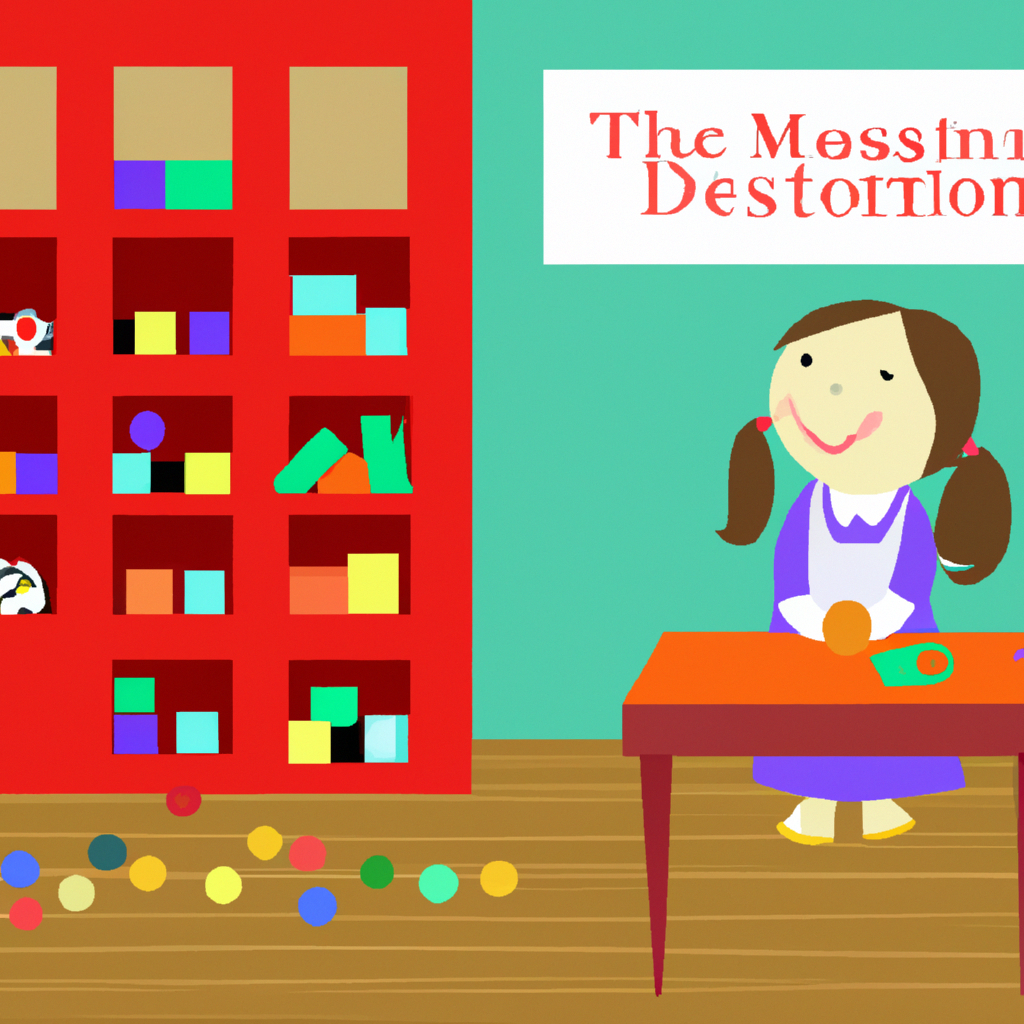
As a taxpayer, I often think about how much I can deduct from my taxes by donating toys to a Montessori school. It feels like uncovering a hidden treasure!
Understanding the ins and outs of tax deductions for charitable contributions can be a game-changer in maximizing your benefits. In this article, we will delve into the eligibility criteria, required documentation, and even explore how to determine the fair market value of donated toys.
Get ready to unlock the secrets of tax deductions through the power of giving!
Key Takeaways
- Donations to Montessori schools can be deducted from taxes if eligibility requirements are met.
- Proper documentation, such as receipts and acknowledgment letters, is essential to claim tax benefits for donations.
- Accurate determination of the fair market value of donated toys is crucial for deducting the correct amount.
- Donations must be made to qualified organizations, and detailed lists of donated items are required.
Eligibility for Tax Deductions
You can deduct a portion of your donations from your taxes if you meet the eligibility requirements.
When it comes to donating to charitable organizations, it’s important to ensure that they have tax-exempt status. This means that the organization has been granted tax-exempt status by the Internal Revenue Service (IRS).
To be eligible for deductions, the organization must be recognized as a 501(c)(3) nonprofit. This status allows them to receive tax-deductible donations and exempts them from paying federal income tax.
Before making a donation, it’s crucial to verify the organization’s tax-exempt status by checking the IRS database or asking for their tax-exempt letter.
Understanding Charitable Contributions
When it comes to making charitable contributions, understanding the tax deductions for donations, Montessori school eligibility, and documentation requirements is crucial.
As an individual looking to maximize my tax benefits, it is important to know the rules and regulations surrounding these key points.
Tax Deductions for Donations
If you donate toys to a Montessori school, you can deduct a certain amount from your taxes. The eligibility requirements for this deduction are fairly straightforward.
First, the school must be a qualified charitable organization, which means it is recognized by the IRS as a nonprofit entity. Second, you must have documentation of your donation, such as a receipt or letter from the school acknowledging your contribution.
As for the tax benefits, the amount you can deduct depends on the fair market value of the toys you donated. It’s important to keep in mind that the IRS has specific rules and limits when it comes to deducting charitable contributions, so consulting a tax professional is recommended.
Now, let’s explore the eligibility criteria for a Montessori school in more detail.
Montessori School Eligibility
To determine if a school is eligible for tax deductions, it is important to verify its status as a qualified charitable organization. When considering donating to a Montessori school, there are several factors to consider regarding its eligibility for tax benefits:
- The school must be recognized as a nonprofit organization by the IRS.
- It should have a 501(c)(3) status, which ensures that it operates for educational or charitable purposes.
Understanding these donation requirements can evoke a sense of reassurance and confidence in the audience. Knowing that their contribution will support a reputable institution with a genuine commitment to education and charitable work can be emotionally fulfilling.
Transitioning into the subsequent section about documentation requirements for deductions, it is crucial to ensure that you have the necessary paperwork in order to claim your tax benefits.
Documentation Requirements for Deductions
Having the proper paperwork is essential in order to claim your tax benefits for donations made. As per IRS guidelines, recordkeeping is crucial when it comes to deducting donations from your taxes. To ensure that you meet the necessary requirements, it is important to keep accurate documentation of your donations.
This includes receipts, cancelled checks, or bank statements that clearly indicate the amount and date of the donation. Additionally, if the value of your donation is over $250, you will need a written acknowledgment from the organization stating the value of the donation and whether any goods or services were received in return.
By following these recordkeeping guidelines, you can confidently claim your tax benefits and maximize your deductions.
Now let’s discuss the documentation and receipts required for donating toys to a Montessori school.
Documentation and Receipts Required
When it comes to making charitable donations, it is important to have proof of your contribution. This proof can come in the form of a receipt or a letter from the organization acknowledging your donation. Without this documentation, it may be difficult to claim your deduction on your taxes.
In addition to proof of donation, keeping detailed records of your contributions is essential. This includes keeping track of the date, amount, and recipient of each donation, as well as any additional expenses incurred in the process.
These records will not only help you accurately report your donations, but also provide necessary documentation in case of an audit.
Proof of Donation Necessary
You’ll need to provide proof of donation for the toys in order to deduct them from your taxes. Here are the key things to know about the proof of donation and tax deduction process:
-
Receipts: Make sure to obtain a receipt from the Montessori school acknowledging your toy donation. This document is crucial as it serves as proof of your contribution.
-
Description of Items: Keep a detailed list of the toys you donated. Include descriptions, quantities, and the estimated value of each item. This will help support your deduction claim.
-
Fair Market Value: Determine the fair market value of the toys. This is the price that a willing buyer would pay and a willing seller would accept. It’s important to be accurate and reasonable in estimating the value.
-
Documentation: Keep all documentation related to the donation, such as emails, letters, and any correspondence with the school. These records will strengthen your case during an audit.
Ensuring you have detailed records of your donation is essential to maximizing your tax deduction and providing evidence if needed.
Detailed Records Are Essential
To maximize your tax deduction and provide evidence if needed, it is crucial to keep detailed records of your donation. Accurate records are of utmost importance when it comes to claiming your potential tax savings.
By keeping detailed records, you will have the necessary documentation to support your donation and ensure that you receive the maximum tax benefit. Your records should include information such as the date of the donation, a description of the toys donated, and the fair market value of each item. These records will not only help you determine the value of your donation but also serve as proof in case of an audit.
Now, let’s move on to determining the fair market value of donated toys.
Determining the Fair Market Value of Donated Toys
Determining the fair market value of donated toys can help you accurately deduct the amount from your taxes. It is important to understand the valuation process and the tax implications involved. Here are some key points to consider:
- Researching similar toys: Look for similar toys being sold online or in stores to get an idea of their market value.
- Consulting experts: Reach out to toy collectors or appraisers who can provide a professional opinion on the value of the toys.
- Appraisal documentation: If the value of your donated toys exceeds $500, you will need a qualified appraisal to support your deduction.
By accurately determining the fair market value of your donated toys, you can ensure that you are deducting the right amount from your taxes.
Now, let’s discuss the limits and restrictions on deductions to further understand the impact of your donation.
Limits and Restrictions on Deductions
When it comes to deductions for donated toys, it’s important to be aware of the limits and restrictions that may affect your tax benefits. The IRS has specific guidelines on how much you can deduct and what types of donations are eligible. Here are the key points to keep in mind:
| Limits on Deductions | Donation Requirements | Documentation Needed |
|---|---|---|
| Maximum of 50% of your adjusted gross income | Donations must be made to qualified organizations | Receipts or written acknowledgment from the organization |
| Appraisal required for donated items over $5,000 | Fair market value must be determined for each item | Written appraisal by a qualified appraiser |
| Deductions may be limited for certain types of property | Donations of clothing and household items must be in good condition | Detailed list of items donated |
Maximizing Tax Benefits Through Donations
By strategizing your charitable donations, you can optimize the tax benefits you receive. To maximize tax savings, it is essential to employ effective tax planning strategies.
One such strategy is to donate appreciated assets rather than cash. By donating appreciated assets, such as stocks or real estate, you can avoid capital gains tax while still receiving a deduction for the fair market value of the asset.
Another strategy is to bundle your donations. Instead of making smaller donations throughout the year, consider making larger contributions in a single year to surpass the standard deduction threshold. This allows you to itemize deductions and potentially increase your tax savings.
Lastly, don’t forget to keep proper documentation of all your donations, including receipts and acknowledgment letters, as this is crucial for claiming deductions.
Frequently Asked Questions
Can I Deduct the Cost of Shipping the Donated Toys to the Montessori School?
Yes, you can deduct the cost of shipping the donated toys to the Montessori school. This includes the cost of packaging materials used to ship the toys, as well as the cost of hiring a shipping company to deliver the toys. These expenses are considered as part of your charitable contribution and can be deducted from your taxes.
It’s important to keep all receipts and documentation to support your deduction.
Are There Any Specific Types of Toys That Are Not Eligible for Tax Deductions?
When it comes to donating toys to a Montessori school and deducting them from your taxes, it’s important to consider the types of toys that are not eligible for tax deductions.
Some factors to consider when choosing toys for tax deductions include their educational value and appropriateness for the school’s curriculum. It’s best to avoid donating toys that are purely recreational or have no educational benefit.
Can I Claim a Tax Deduction if I Donate Used Toys Instead of New Ones?
When donating toys, it’s important to understand the potential tax benefits.
If you choose to donate used toys instead of new ones, you can still claim a tax deduction. The amount you can deduct depends on the fair market value of the toys at the time of donation.
It’s recommended to keep records of the donation and consult with a tax professional to ensure you are deducting the correct amount.
Is There a Maximum Limit on the Amount of Toys I Can Donate and Claim as a Tax Deduction?
There’s no feeling quite like the joy of giving, especially when it comes to donating toys. But when it comes to claiming a tax deduction for those donations, there are a few things to consider.
One question that often arises is whether there’s a maximum limit on the amount of toys you can donate and still claim a tax deduction.
Additionally, you may wonder if you’re eligible for a tax deduction if you donate toys to a Montessori school outside your local area.
Let’s dive into these questions and find some answers.
Can I Claim a Tax Deduction for Donating Toys to a Montessori School That Is Located Outside of My Local Area?
Yes, you can claim a tax deduction for donating toys to a Montessori school located outside of your local area. Donating toys to a qualified organization, such as a Montessori school, can provide you with tax benefits.
Conclusion
In conclusion, donating toys to a Montessori school can have significant tax benefits.
By understanding the eligibility requirements for tax deductions and ensuring proper documentation and receipts are kept, individuals can maximize their deductions.
It is important to determine the fair market value of the donated toys and be aware of any limits or restrictions on deductions.
Remember, donating toys not only helps the school but also allows you to give back to the community while enjoying potential tax savings.
As the saying goes, ‘One man’s trash is another man’s treasure.’
Tina is the heart and soul behind Toddler Ride On Toys. With a passion for early childhood education and a deep understanding of child development, Tina ensures that every piece of content on our website reflects our commitment to playful learning. Her expertise in Montessori, Preschool, STEM, and Waldorf education philosophies helps shape our website into a valuable resource for parents, caregivers, and educators.
Montessori Toys
Why Montessori Toys?
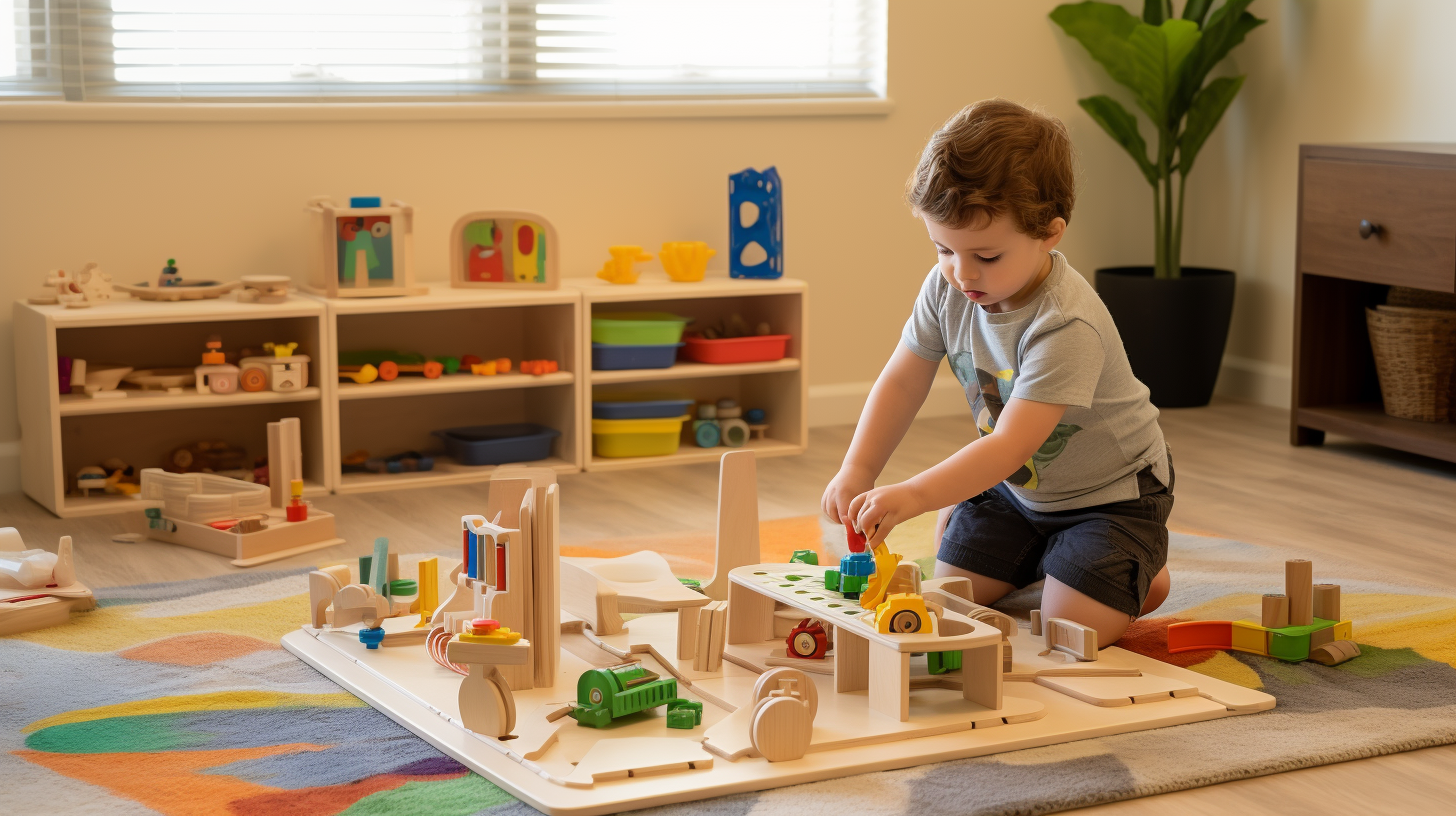
As a parent, I have always been fascinated by the impact of toys on my child’s development.
Did you know that Montessori toys, inspired by the educational approach developed by Maria Montessori, have been proven to enhance crucial skills in children?
In this article, we’ll explore why Montessori toys are so effective and how they promote:
- Independence
- Language and communication skills
- Creativity and imagination
- Numeracy skills
- Science and nature exploration
Additionally, we’ll delve into how Montessori toys foster cultural and global awareness.
Let’s dive in!
Key Takeaways
- Montessori toys promote physical development through activities that improve fine motor and gross motor skills.
- Montessori toys encourage sensory exploration, allowing children to engage their senses and develop their sensorial exploration skills.
- Montessori toys support cognitive development by providing opportunities for problem-solving and developing numeracy skills.
- Montessori toys foster social and emotional development, enhancing emotional intelligence and promoting creativity, imagination, and cultural and global awareness.
The History of Montessori Toys
The history of Montessori toys dates back to the early 20th century when Maria Montessori developed her innovative educational approach. Montessori believed that children learn best through hands-on experiences and self-directed exploration. She designed toys that were specifically tailored to facilitate learning and development in young children.
These toys were carefully crafted to engage children’s senses and promote cognitive, physical, and social-emotional growth. Montessori toys were designed to be simple and aesthetically pleasing, with a focus on natural materials such as wood and fabric. They were also designed to be open-ended, allowing children to use their imagination and creativity while playing.
These toys have since become popular worldwide due to their effectiveness in promoting child development. Transitioning into the subsequent section, the benefits of Montessori toys for child development are significant and far-reaching.
Benefits of Montessori Toys for Child Development
When it comes to child development, Montessori toys have been shown to provide a range of benefits.
Firstly, these toys enhance cognitive skills by promoting problem-solving, critical thinking, and logical reasoning.
Additionally, they foster independent learning by encouraging self-directed exploration and decision-making.
Lastly, Montessori toys promote sensory exploration, allowing children to engage with different textures, colors, and sounds, which can stimulate their senses and contribute to their overall sensory development.
Enhances Cognitive Skills
By using Montessori toys, you can enhance your child’s cognitive skills. These toys are specifically designed to stimulate mental development and improve memory retention. Through hands-on exploration, children are encouraged to engage with their environment and actively problem-solve.
Montessori toys provide opportunities for children to think critically and find solutions independently. For example, puzzles and sorting games improve memory by requiring children to remember patterns and sequences. Additionally, building blocks and shape sorters enhance problem-solving abilities by challenging children to find the right fit or create structures.
Fosters Independent Learning
To foster independent learning, I encourage my child to explore, discover, and problem-solve on their own. By providing them with Montessori toys, I am empowering them to take charge of their own learning journey.
These toys are specifically designed to promote self-directed learning, allowing children to engage in activities that align with their interests and abilities. With Montessori toys, children are encouraged to make choices, set goals, and solve problems independently. This not only boosts their confidence and self-esteem but also nurtures their critical thinking and decision-making skills.
Montessori toys provide a supportive environment for children to explore, learn, and grow at their own pace, fostering a love for learning that extends beyond the classroom.
Transitioning into the next section on ‘promotes sensory exploration,’ Montessori toys offer a multi-sensory experience that stimulates children’s senses and enhances their overall learning experience.
Promotes Sensory Exploration
Promoting sensory exploration enhances children’s overall learning experience and helps them engage with their environment in a meaningful way. Sensory play, such as engaging with different textures, shapes, and materials, provides children with valuable tactile stimulation. This type of play stimulates their senses and encourages them to explore and learn about the world around them.
Research has shown that sensory play can improve cognitive, social, and emotional development in children. It helps them develop fine motor skills, problem-solving abilities, and language skills. By engaging their senses, children become active participants in their learning process, fostering curiosity and a love for exploration.
As we transition into discussing Montessori principles and toy selection, it is important to recognize that sensory exploration is a key aspect of the Montessori approach, which prioritizes hands-on, experiential learning.
Montessori Principles and Toy Selection
When choosing Montessori toys, it’s important to consider how they align with Montessori principles and support your child’s development.
Montessori principles emphasize providing children with opportunities for independence, freedom within limits, and hands-on learning. Therefore, it’s important to select toys that encourage self-directed play, foster problem-solving skills, and promote sensory exploration.
Montessori toys are typically made from natural materials such as wood or fabric, and they are designed to engage multiple senses. These toys often have simple, open-ended designs that allow children to use their imagination and creativity.
By selecting Montessori toys that align with these principles, you can create an environment that supports your child’s natural curiosity, independence, and cognitive development.
Now, let’s explore how Montessori toys promote independence without explicitly stating ‘step’.
How Montessori Toys Promote Independence
Encouraging self-directed learning and fostering decision-making skills are crucial aspects of a child’s development. By providing children with Montessori toys, we can empower them to take charge of their learning journey and make independent choices.
These toys are specifically designed to promote hands-on exploration, problem-solving, and critical thinking, allowing children to develop their decision-making abilities while engaging in meaningful play.
Encouraging Self-Directed Learning
To foster self-directed learning, you can let your child explore Montessori toys at their own pace. These toys are specifically designed to promote independent exploration and provide opportunities for self-directed learning. Here are some benefits of allowing your child to engage with Montessori toys:
-
Enhances problem-solving skills: Montessori toys are designed to present challenges that require active problem-solving. This encourages children to think critically and develop their problem-solving skills.
-
Promotes creativity: By allowing children to explore Montessori toys independently, they are encouraged to use their imagination and think creatively. This helps in developing their creativity and fostering their natural curiosity.
Fostering Decision-Making Skills
In the previous section, we discussed how Montessori toys encourage self-directed learning. Now, let’s explore how these toys foster critical thinking and encourage autonomy in children.
Critical thinking is an essential skill that allows children to analyze information, make reasoned judgments, and solve problems effectively. Montessori toys are designed to stimulate curiosity and engage children in hands-on activities that require problem-solving and decision-making. By providing open-ended materials and activities, these toys promote creativity and independent thinking.
Children are encouraged to explore and discover on their own, which helps develop their decision-making skills. They learn to assess options, weigh pros and cons, and make choices, all while building confidence in their abilities. This autonomy not only enhances their cognitive development but also prepares them for real-life situations where decision-making is crucial.
Now, let’s delve into how Montessori toys can aid in language and communication skills development.
Montessori Toys for Language and Communication Skills
Montessori toys can help children develop their language and communication skills. These toys are carefully designed to engage children in activities that promote language development and communication.
Here are three examples of Montessori toys that support these skills:
-
Language puzzles: These puzzles feature pictures and corresponding words, encouraging children to identify and match the correct words with the images. This helps them expand their vocabulary and improve their word recognition skills.
-
Storytelling sets: These sets include props and characters that children can use to create and act out stories. This fosters their creativity and imagination, while also enhancing their language skills as they narrate their stories.
-
Alphabet blocks: These blocks have letters on them, allowing children to practice letter recognition, spelling, and even forming simple words. This helps them develop their phonetic awareness and early reading skills.
By engaging with these Montessori toys, children can strengthen their language and communication abilities.
Now, let’s explore how Montessori toys can also promote fine motor development.
Montessori Toys for Fine Motor Development
By engaging with these carefully designed toys, you can enhance your child’s fine motor development. Fine motor control refers to the coordination of small muscles in the hands and fingers, enabling activities like grasping, writing, and buttoning. Montessori toys for fine motor development are specifically designed to promote the refinement of these skills, while also stimulating sensory development. These toys often incorporate different textures, shapes, and sizes to engage the senses and provide a multi-sensory experience. The use of Montessori toys can help children develop hand-eye coordination, finger dexterity, and spatial awareness. They encourage children to explore and manipulate objects, fostering independence and problem-solving abilities. By providing opportunities for hands-on learning and practice, Montessori toys play a crucial role in supporting the development of fine motor skills in children.
Transitioning into the subsequent section about Montessori toys for gross motor development, it is important to note that these toys focus on larger movements and physical coordination.
Montessori Toys for Gross Motor Development
When it comes to the benefits of movement and enhancing physical coordination, research has shown that engaging in regular physical activity has numerous positive effects on both the body and mind.
Studies have found that movement not only improves cardiovascular health and strengthens muscles, but it also enhances cognitive function and aids in the development of coordination skills.
Additionally, incorporating movement into daily routines can help reduce stress, improve mood, and increase overall wellbeing.
Benefits of Movement
Physical activity is crucial for children’s development and overall well-being. It not only promotes a healthy lifestyle but also plays a significant role in improving balance and developing coordination. Research has shown that engaging in regular physical activity helps children enhance their motor skills and body control.
Here are some key benefits of movement for children:
-
Improved balance:
Engaging in activities like walking on a balance beam or playing catch can help children develop better balance skills. Balance is essential for maintaining stability and preventing falls, which is especially important during growth spurts. -
Developed coordination:
Activities that involve hand-eye coordination, such as throwing and catching a ball or playing with building blocks, can help children improve their coordination skills. Developing coordination allows children to perform tasks with precision and efficiency.
Enhancing Physical Coordination
You can improve your physical coordination by engaging in activities that require hand-eye coordination, such as playing catch or throwing a ball. Enhancing physical coordination is crucial for overall physical development and plays a significant role in improving balance and developing gross motor skills.
Research has shown that activities that challenge hand-eye coordination help in strengthening neural connections between the brain and the muscles, leading to improved coordination skills. These activities also promote better balance, as they require the body to maintain stability while performing precise movements.
Developing gross motor skills, which involve the larger muscles of the body, is essential for activities like running, jumping, and climbing. Building strong coordination and balance through these activities lays a foundation for further physical development.
Transitioning into the subsequent section about Montessori toys for sensorial exploration, we can apply the principles of coordination and balance to engage children in hands-on activities that stimulate their senses and enhance their overall development.
Montessori Toys for Sensorial Exploration
If you’re looking to promote sensorial exploration, Montessori toys are a great choice. These toys are specifically designed to provide tactile stimulation and enhance sensory development in children.
Here are three reasons why Montessori toys are beneficial for sensorial exploration:
-
Varied Textures: Montessori toys offer a wide range of textures, allowing children to engage their sense of touch. From smooth wooden blocks to fuzzy fabric balls, these toys provide opportunities for children to explore different tactile sensations.
-
Sensory Engagement: Montessori toys are designed to engage multiple senses simultaneously. For example, a musical instrument toy not only produces sounds but also offers a tactile experience through the use of buttons or keys.
-
Hands-on Learning: Montessori toys encourage hands-on exploration, allowing children to actively engage with their environment. This hands-on approach stimulates their sensory receptors and promotes overall sensory development.
Montessori Toys for Cognitive Development
When considering cognitive development, it’s important to provide toys that encourage problem-solving and critical thinking skills. Montessori toys for learning are designed with these goals in mind. These toys are carefully crafted to engage children in activities that promote cognitive growth and development.
Montessori toys for cognitive development often involve puzzles, building blocks, and shape sorters, which challenge children to think logically and creatively. These toys stimulate the brain and help children develop skills such as problem-solving, decision-making, and spatial awareness. Studies have shown that children who engage with Montessori toys for cognitive development exhibit enhanced cognitive abilities and better academic performance.
By providing these toys, parents and educators can support children in their cognitive development journey.
Transitioning to the next section, Montessori toys also play a crucial role in fostering social and emotional development.
Montessori Toys for Social and Emotional Development
As I delve into the topic of Montessori toys and their benefits, it becomes clear that these toys play a significant role in enhancing emotional intelligence.
Research suggests that Montessori toys, with their focus on hands-on learning and self-directed play, can help children develop emotional skills such as empathy, self-regulation, and problem-solving.
The open-ended nature of these toys encourages creativity and imagination, fostering emotional growth and a deeper understanding of oneself and others.
Benefits of Montessori Toys
One of the benefits of Montessori toys is that they encourage independent learning and problem-solving skills. These toys provide hands-on learning experiences that require children to actively engage with their environment. By manipulating the toys and exploring different possibilities, children develop critical thinking and problem-solving abilities.
This type of learning fosters a sense of self-confidence and independence, as children are able to accomplish tasks on their own. Research has shown that hands-on learning experiences are effective in promoting self-confidence and a positive self-image in children. As they successfully solve problems and achieve goals, they gain a sense of accomplishment and build resilience. This foundation of self-confidence is crucial for children’s overall development and prepares them for future challenges.
Additionally, the hands-on nature of Montessori toys encourages creativity and imagination, further enhancing children’s cognitive and emotional development. By engaging with these toys, children are able to explore their own ideas and express themselves freely, which ultimately contributes to their emotional intelligence.
Enhancing Emotional Intelligence
Enhancing emotional intelligence can be achieved through hands-on learning experiences that promote self-confidence and independence.
When it comes to enhancing empathy, engaging with others through cooperative play and shared problem-solving activities can help develop a deeper understanding of others’ emotions and perspectives.
Additionally, participating in activities that encourage self-reflection and introspection can aid in developing self-awareness, a crucial component of emotional intelligence.
By providing opportunities for children to explore and express their emotions in a safe and supportive environment, they can learn how to regulate their own emotions and better understand the emotions of others.
Transitioning into the subsequent section about Montessori toys for problem-solving skills, it is important to note that these toys not only promote cognitive development but also contribute to the overall enhancement of emotional intelligence.
Montessori Toys for Problem-Solving Skills
Montessori toys can help children develop problem-solving skills and critical thinking skills. These toys are designed to engage children in activities that require them to think and solve problems on their own.
For example, puzzles and building blocks encourage children to think logically and figure out how to fit the pieces together. This not only enhances their problem-solving skills but also promotes critical thinking as they analyze different ways to approach the task at hand.
By providing children with opportunities to engage in open-ended play, Montessori toys foster creativity and imagination. This aspect of play allows children to explore and experiment, leading to the development of innovative thinking and imaginative skills.
As children engage with these toys, they learn to think outside the box and find unique solutions to challenges they encounter.
Montessori Toys for Creativity and Imagination
Montessori toys are not only beneficial for developing problem-solving skills, but they also play a crucial role in fostering creativity and imagination in children. These toys are designed to encourage open-ended play, allowing children to explore their own ideas and create their own narratives. By providing a variety of materials and tools, such as building blocks, art supplies, and pretend play sets, Montessori toys stimulate imaginative play and enable children to express themselves freely.
To illustrate the importance of Montessori toys for creativity and imagination, consider the following examples:
Toy Benefits Wooden blocks Enhances spatial awareness and promotes the construction of unique structures. Dress-up costumes Encourages role-playing and storytelling, enabling children to explore different characters and scenarios. Art supplies Stimulates self-expression and creativity through painting, drawing, and sculpting.
These toys not only entertain children but also provide opportunities for them to develop their imaginative thinking and problem-solving skills.
Next, let’s explore Montessori toys for numeracy skills.
Montessori Toys for Numeracy Skills
Mathematical skills can be developed through the use of educational toys. Montessori toys for early childhood development are specifically designed to help children learn mathematical concepts in a hands-on and interactive way. These toys provide opportunities for children to explore and manipulate objects, helping them understand basic mathematical principles such as counting, sorting, and sequencing.
Montessori toys for mathematical concepts often include activities like shape sorting puzzles, number rods, and counting beads. By engaging with these toys, children develop their numeracy skills, including number recognition, one-to-one correspondence, and basic arithmetic operations. These toys also encourage problem-solving and critical thinking, as children are challenged to find solutions and make connections between different mathematical concepts.
As children become more proficient in numeracy skills, they are better equipped to understand more complex mathematical concepts in the future.
Moving on to Montessori toys for science and nature exploration…
Montessori Toys for Science and Nature Exploration
After exploring Montessori toys that promote numeracy skills, let’s delve into the world of science and nature exploration toys.
These toys are designed to foster curiosity and a love for the natural world in children. Science-based toys, such as microscopes, telescopes, and chemistry sets, provide hands-on experiences that encourage scientific thinking and experimentation.
Nature exploration toys, such as bug catchers, bird feeders, and gardening kits, allow children to observe and interact with the world around them. By engaging with these toys, children develop critical thinking skills, learn about scientific concepts, and develop a deep appreciation for nature. These toys also offer opportunities for children to explore their creativity and problem-solving abilities.
Now, let’s transition to the next section and explore Montessori toys for cultural and global awareness.
Montessori Toys for Cultural and Global Awareness
As I explore toys that promote cultural and global awareness, I discover a wide range of options that introduce children to different customs, traditions, and languages from around the world. These toys not only foster an appreciation for cultural diversity but also nurture the development of global citizenship in young minds.
One example of such a toy is a world map puzzle that showcases different countries and continents. This interactive toy allows children to learn about geography while also gaining knowledge about various cultures and lifestyles. Similarly, multicultural dolls provide children with the opportunity to explore different ethnicities and understand the importance of inclusivity.
Frequently Asked Questions
Are Montessori Toys Only Suitable for a Certain Age Group?
Montessori toys are not only suitable for a certain age group. They are designed to meet the developmental needs of children at different stages.
The age suitability of Montessori toys is based on the principles of Maria Montessori’s educational approach, which emphasizes hands-on learning and individualized instruction.
These toys promote independent thinking, problem-solving, and fine motor skills. They also encourage creativity and foster a love for learning.
Overall, Montessori toys offer numerous benefits for children of various ages.
Can Montessori Toys Be Used in a Traditional Classroom Setting?
Incorporating Montessori toys into a traditional classroom setting has numerous benefits.
Not only do these toys promote hands-on learning, but they also encourage independent thinking and problem-solving skills.
By providing children with the opportunity to engage with materials that are both educational and enjoyable, Montessori toys can enhance the overall learning experience.
Additionally, these toys can help foster a sense of creativity and imagination in students.
Overall, incorporating Montessori toys in a traditional classroom can lead to a more engaging and effective learning environment.
How Do Montessori Toys Differ From Other Types of Educational Toys?
Montessori toys differ from other types of educational toys in their emphasis on hands-on learning and independent exploration. They are designed to promote self-directed learning and encourage children to engage in activities that develop their cognitive, physical, and social-emotional skills.
Research has shown that Montessori toys are effective in fostering creativity, problem-solving abilities, and critical thinking skills. The benefits of using Montessori toys include promoting a love for learning, enhancing concentration and focus, and fostering independence and confidence in children.
Are Montessori Toys More Expensive Than Other Toys on the Market?
Are Montessori toys worth the investment, given their higher price point?
Well, it’s true that Montessori toys can be more expensive compared to other toys on the market. However, the benefits they offer make them a worthwhile investment.
Montessori toys are designed to promote independent learning, problem-solving skills, and creativity. They also focus on developing fine motor skills and fostering a sense of order and concentration.
While there may be affordable alternatives available, it’s essential to consider the unique benefits that Montessori toys provide.
Are There Any Specific Safety Guidelines to Consider When Using Montessori Toys?
When it comes to using Montessori toys, there are indeed specific safety guidelines to consider.
It is crucial to ensure that the toys are age suitable for the child. This means checking for small parts that could pose a choking hazard, sharp edges that could cause injury, and toxic materials that could be harmful if ingested.
Additionally, it’s important to supervise children during playtime and regularly inspect the toys for any signs of wear or damage.
Following these safety guidelines helps to create a safe and enriching play environment for children.
Conclusion
In conclusion, I must say that after exploring the history, benefits, and principles of Montessori toys, I am truly convinced of their effectiveness in promoting child development.
The coincidence of Montessori principles aligning perfectly with the needs and abilities of young children is truly remarkable.
The evidence-based approach and focus on independence, language skills, creativity, numeracy, and cultural awareness make Montessori toys a valuable tool for parents and educators alike.
So, why Montessori toys? Because they are not just toys, but powerful tools for fostering growth and learning in young minds.
With a background in early childhood education and a genuine enthusiasm for fostering learning through play, Ava’s writing transcends the mundane and transforms into a beacon of inspiration for our readers. Her dedication to understanding the intricacies of Montessori, Preschool, STEM, and Waldorf philosophies enriches her content with a level of authenticity that makes Toddler Ride On Toys a go-to resource.
Montessori Toys
Why Are Montessori Toys Better
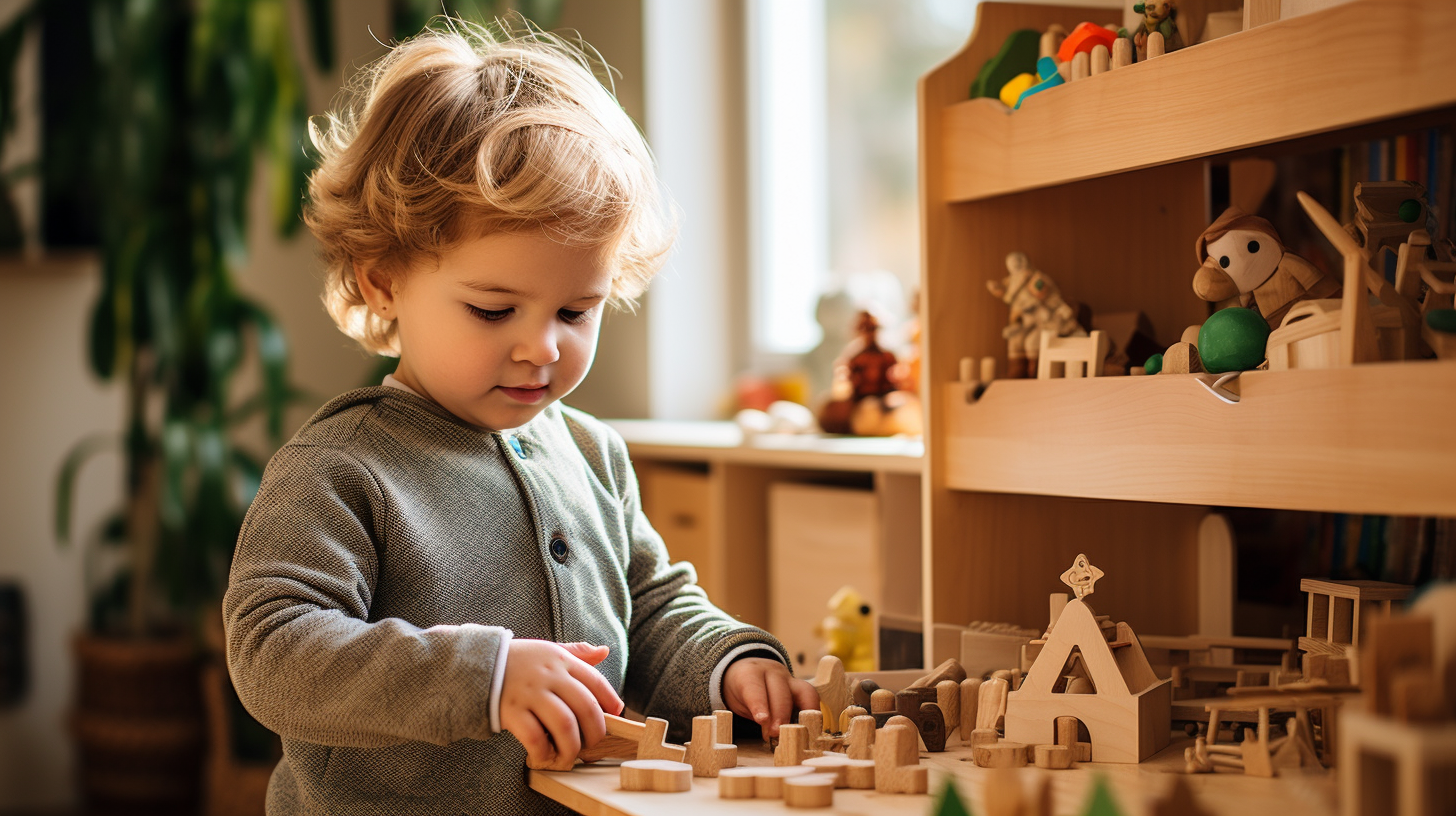
As a parent, my top goal is to discover toys that truly support my child’s development. That’s why I’ve grown to value the importance of Montessori toys.
These toys offer a hands-on approach to learning, allowing children to explore and discover at their own pace. With Montessori toys, independent play becomes a catalyst for growth and creativity.
But what sets them apart from traditional toys? In this article, we’ll delve into the benefits of Montessori toys and why they are a superior choice for your child’s playtime.
Key Takeaways
- Montessori toys promote cognitive growth, problem-solving skills, and critical thinking.
- These toys engage children in hands-on activities, fostering independence and self-confidence.
- Montessori toys support natural curiosity, desire to learn, and overall development.
- They enhance fine motor skills, hand-eye coordination, and sensory exploration.
Benefits of Montessori Toys
There’s a variety of benefits that come with using Montessori toys. These toys are specifically designed to promote cognitive growth and enhance problem-solving skills in children. Research has shown that Montessori toys engage children in hands-on activities that stimulate their thinking and problem-solving abilities.
By using these toys, children are encouraged to explore, manipulate, and discover new concepts and ideas on their own. This not only helps in developing their cognitive skills but also fosters a sense of independence and self-confidence.
Montessori toys provide open-ended play opportunities, allowing children to think critically, make decisions, and find creative solutions to challenges. These toys support children’s natural curiosity and desire to learn, laying a strong foundation for their overall development.
Moving forward, let’s explore the developmental advantage of Montessori toys.
Developmental Advantage of Montessori Toys
One of the advantages of Montessori toys is that they can support children’s cognitive and motor development. Montessori toys are carefully designed to engage children in learning through play, which has been shown to have numerous developmental benefits.
When children play with Montessori toys, they are actively exploring, problem-solving, and using their imagination. This type of play helps to develop their cognitive skills, such as critical thinking, problem-solving, and creativity. Additionally, Montessori toys often involve hands-on manipulation, which can improve children’s fine motor skills and hand-eye coordination.
Research has shown that learning through play with Montessori toys can enhance children’s overall development and prepare them for academic success.
Transitioning into the subsequent section about ‘Montessori toys: a hands-on approach to learning,’ it is important to understand the various ways in which these toys engage children in active learning experiences.
Montessori Toys: A Hands-on Approach to Learning
https://www.youtube.com/watch?v=bv3qQk8E6Kk
When children play with Montessori toys, they’re actively engaged in hands-on learning experiences. Montessori toys are specifically designed to promote hands-on learning and sensory development. These toys are carefully crafted to encourage children to explore, manipulate, and interact with their surroundings.
By engaging their senses, such as touch, sight, and hearing, children are able to fully immerse themselves in the learning process. Research has shown that hands-on learning experiences not only enhance cognitive development but also improve problem-solving skills, creativity, critical thinking, and fine motor skills.
Through the use of Montessori toys, children are able to actively participate in their own learning journey, making connections and discoveries independently. This independence and self-directed learning fostered by Montessori toys set the foundation for promoting independent play in children.
How Montessori Toys Promote Independent Play
By encouraging exploration and interaction, Montessori toys foster independent play in children. These toys are specifically designed to enhance creativity and foster problem-solving skills, allowing children to engage in open-ended play that stimulates their imagination and critical thinking abilities.
Unlike traditional toys that often have predetermined outcomes or limited options for play, Montessori toys provide children with the freedom to explore and discover at their own pace. They are carefully crafted to promote hands-on learning experiences, encouraging children to actively problem solve and think critically.
Montessori toys also prioritize sensory exploration and fine motor skills development, offering a holistic approach to play and learning. Through independent play with Montessori toys, children gain confidence, independence, and a lifelong love for learning.
In the next section, we will explore what sets Montessori toys apart from traditional toys.
Montessori Toys Vs. Traditional Toys: What Sets Them Apart?
Discovering the unique characteristics of Montessori toys compared to traditional toys will help you understand what sets them apart. Here are some key differences to consider:
-
Open-endedness: Montessori toys are designed to be open-ended, allowing children to use them in a variety of ways and encourage creativity and problem-solving skills.
-
Natural materials: Montessori toys are often made from natural materials like wood and fabric, promoting a sense of connection to the environment and providing a sensory experience.
-
Focus on skill development: Montessori toys are designed to promote specific skills, such as fine motor skills, hand-eye coordination, and concentration.
Research has shown that Montessori toys have a positive impact on cognitive skills and creativity. They provide opportunities for children to explore, experiment, and engage in self-directed play, which enhances their problem-solving abilities and fosters imaginative thinking.
Transitioning into the subsequent section about choosing the right Montessori toys for your child, it’s important to consider their interests, developmental stage, and individual needs.
Choosing the Right Montessori Toys for Your Child
When it comes to choosing Montessori toys for my child, I always make sure they are age-appropriate.
Research suggests that age-appropriate toys not only keep children engaged but also promote their development in various areas such as cognitive, physical, and social skills.
Additionally, Montessori toys offer several benefits, including fostering independence, promoting problem-solving skills, and encouraging creativity and imagination.
Age-Appropriate Montessori Toys
You can easily find age-appropriate Montessori toys that will engage and stimulate your child’s development. These toys are designed specifically for different age groups, ensuring that they are both safe and challenging for your child.
Here are four reasons why age-appropriate Montessori toys are beneficial for your child’s educational development:
-
Cognitive Development: Montessori toys promote problem-solving skills, critical thinking, and creativity, which are essential for cognitive development.
-
Fine Motor Skills: Manipulating Montessori toys helps develop fine motor skills, such as hand-eye coordination and finger dexterity.
-
Sensory Exploration: Montessori toys often incorporate different textures, colors, and sounds, encouraging sensory exploration and stimulating brain development.
-
Independence and Confidence: By allowing your child to independently engage with age-appropriate Montessori toys, they develop a sense of accomplishment and confidence in their abilities.
These educational benefits of Montessori toys lay a strong foundation for the subsequent section on the overall benefits of Montessori toys for your child’s growth and development.
Benefits of Montessori Toys
The benefits of Montessori toys can be grouped into several categories. First, these toys promote cognitive development by challenging children to problem solve, think critically, and use their imagination. Second, they enhance fine motor skills, such as hand-eye coordination and dexterity, through hands-on activities. Third, Montessori toys encourage sensory exploration, allowing children to engage their senses and learn about the world around them. Lastly, these toys foster independence and confidence as children are given the opportunity to explore and play at their own pace, making choices and taking ownership of their learning. Research has shown that Montessori toys are more effective than traditional toys because they stimulate multiple areas of a child’s development. Overall, the developmental benefits of Montessori toys are undeniable, and they play a crucial role in fostering creativity and holistic growth in children.
Frequently Asked Questions
What Are the Recommended Age Ranges for Montessori Toys?
When it comes to recommended age ranges for Montessori toys, it’s important to consider the child’s developmental stage.
Montessori toys are designed to promote independent learning and exploration, so they are typically suitable for children of various ages.
For infants, toys with different textures and shapes can stimulate their senses and motor skills.
Toddlers can benefit from puzzles and sorting toys to enhance their problem-solving abilities.
Preschoolers can engage in more complex activities like building blocks and art materials to foster creativity and fine motor skills.
Are Montessori Toys More Expensive Than Traditional Toys?
When it comes to comparing the cost of Montessori toys and traditional toys, I must say that Montessori toys can be a bit pricier. However, let me assure you that the quality difference is worth every penny.
Montessori toys are carefully designed to promote hands-on learning, independence, and problem-solving skills. They are made from high-quality materials that are safe for children to use.
Can Montessori Toys Be Used in a Classroom Setting?
Yes, Montessori toys can definitely be used in a classroom setting. Classroom integration of Montessori toys has numerous benefits in education.
These toys promote hands-on learning, sensory exploration, and problem-solving skills. They also encourage independence and self-directed learning, which are key components of the Montessori philosophy.
Are There Any Safety Concerns With Montessori Toys?
When it comes to Montessori toys, safety is always a top priority. As a parent, I understand the importance of ensuring that my child’s toys are safe for them to play with.
Common safety concerns with Montessori toys include small parts that could be a choking hazard, sharp edges, and toxic materials. However, it’s important to note that reputable Montessori toy manufacturers adhere to strict safety guidelines, making sure their toys meet the highest standards.
How Can Parents Incorporate Montessori Principles Into Playtime at Home?
When it comes to incorporating Montessori principles into playtime at home, there are a few key strategies to keep in mind.
First, focus on incorporating real-life activities into play, such as cooking or cleaning. This helps children develop practical life skills and promotes independence.
Secondly, provide sensory play experiences and open-ended toys that allow for creativity and problem-solving.
Conclusion
In conclusion, Montessori toys offer numerous benefits for children’s development. They provide a hands-on approach to learning, promoting independent play and fostering a sense of curiosity and exploration.
Compared to traditional toys, Montessori toys focus on engaging the child’s senses and encouraging problem-solving skills. As the saying goes, ‘Give a man a fish and you feed him for a day; teach a man to fish and you feed him for a lifetime.’
Montessori toys empower children to become lifelong learners, setting them up for future success.
Tina is the heart and soul behind Toddler Ride On Toys. With a passion for early childhood education and a deep understanding of child development, Tina ensures that every piece of content on our website reflects our commitment to playful learning. Her expertise in Montessori, Preschool, STEM, and Waldorf education philosophies helps shape our website into a valuable resource for parents, caregivers, and educators.
-

 Child Development2 weeks ago
Child Development2 weeks agoWhat Is a Theory in Child Development
-

 Child Development1 week ago
Child Development1 week agoHow Parenting Styles Affect Child Development
-

 Preschool Toys3 months ago
Preschool Toys3 months agoTop 8 Interactive Role-Play Toys for Preschoolers Reviewed
-

 Child Development2 weeks ago
Child Development2 weeks agoThe Science Behind How Parents Affect Child Development
-

 Child Development2 weeks ago
Child Development2 weeks agoWhat Do You Do in Child Development Class in High School
-

 Waldorf Toys2 weeks ago
Waldorf Toys2 weeks agoTwos and Toys: Waldorf Selections Perfect for Two-Year-Olds
-

 Child Development2 weeks ago
Child Development2 weeks agoHow Does Piaget’s Theory Impact Child Development
-

 Child Development6 days ago
Child Development6 days agoWhat Is Child Development?














